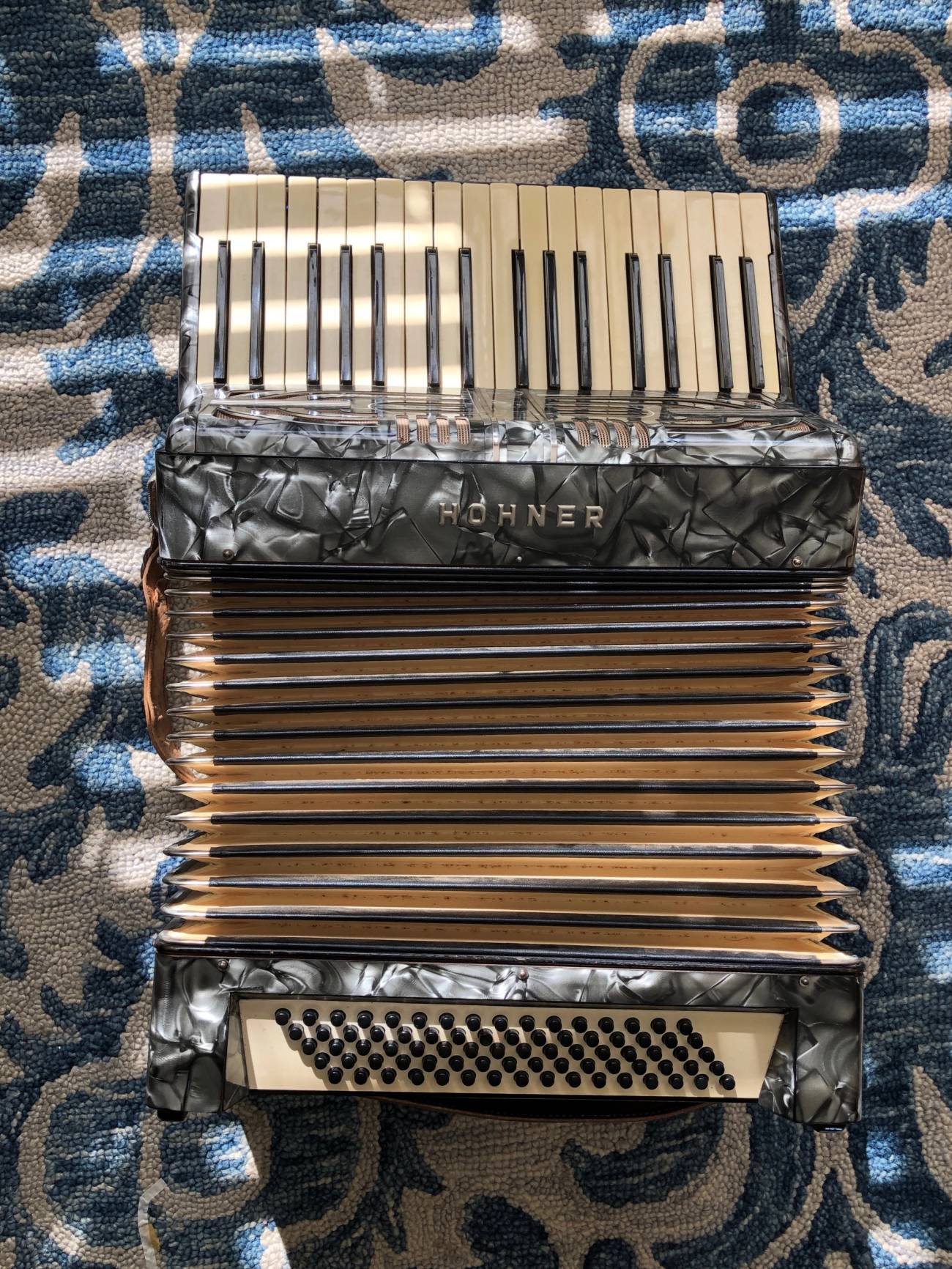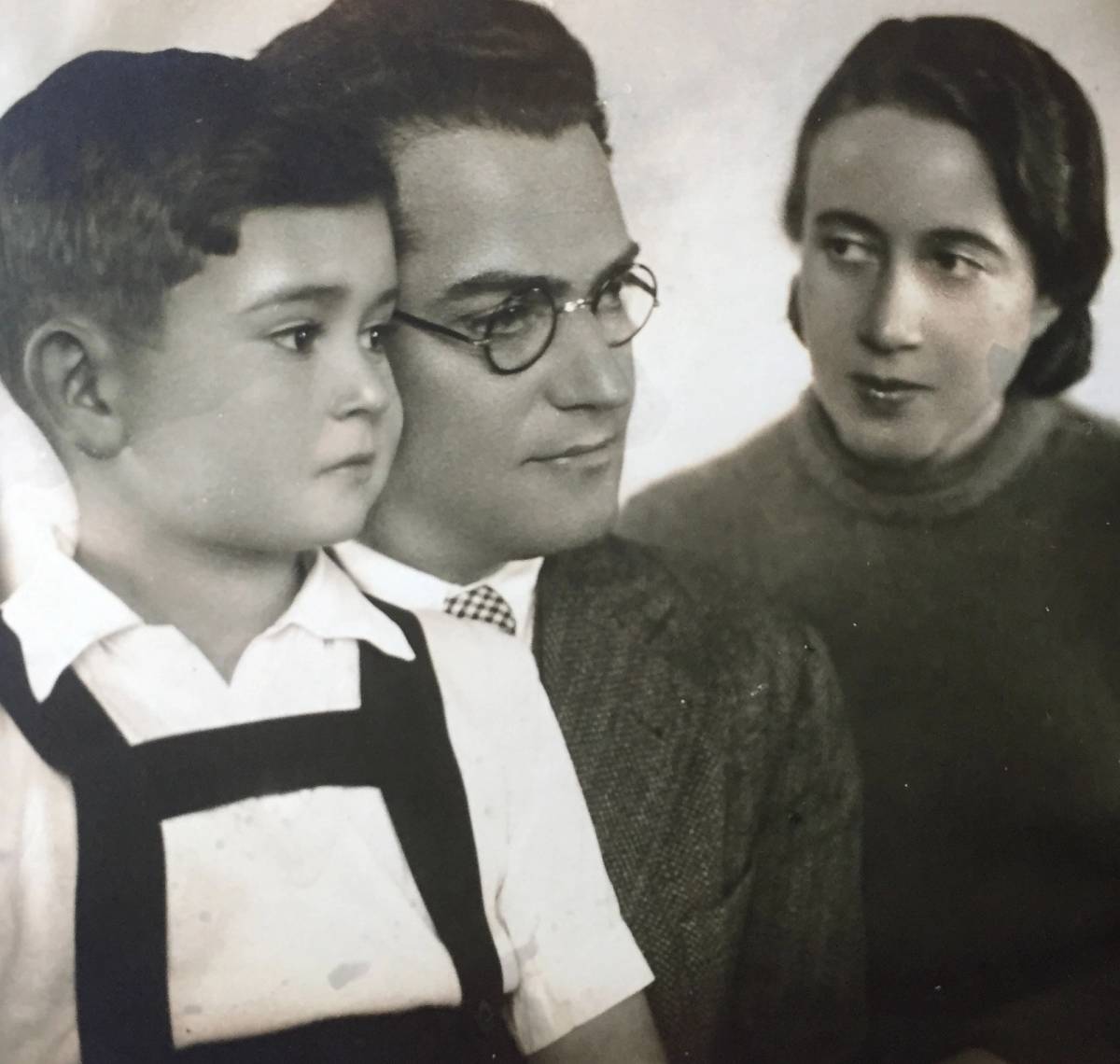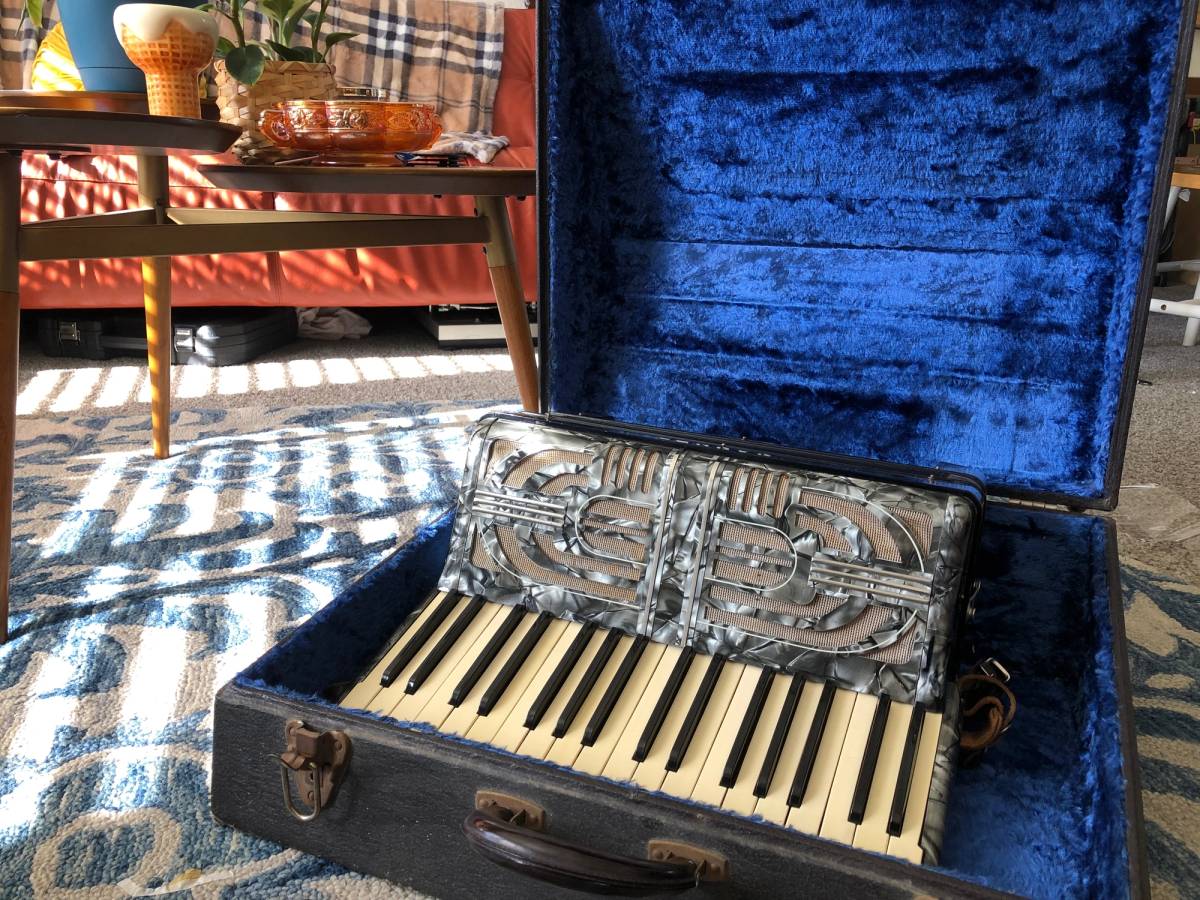The Gift of the Accordion
A story of an instrument that survived the Holocaust, passed down from one generation to another




It was a big day for a California man named Bruno Kaiser, then 92 years old. He was about to say goodbye to his accordion.
This was no easy thing; it had been his for 70 years. Their lives were intertwined, stretching back to that awful time when the retired engineer and business owner was a frightened boy being held in a wartime concentration camp in his native Croatia.
The 80-button accordion predated WWII. Hohner, the German company that built it, still makes musical instruments of quality. But it’s a sure bet that nothing like this sturdy, 15-pound beauty, with its art deco-style graphic look and black-and-silver body, comes off the line today.
Bruno lives in a growing farm community south of the surf capital of Santa Cruz on the California coast. He never surfed but he did downhill ski until he was 88. Lean and tall, with a restless energy and physicality that belies his age, he was ready to go. So, too, was the Hohner, packed in its black case and stored carefully in the back of his Nissan Rogue. Together he and his longtime companion, Tamara, were headed off to see his daughter Jennifer, his two grandsons, and myself.
Bruno is my father-in-law. Jennifer, his youngest daughter, is my wife. Hank is the older of our two sons—an avid musician in his early 20s who plays bass in an R&B hip-hop band. It was mid-2020, the first summer of COVID-19, and Hank was temporarily staying with us until he could return to his home base in San Diego. Knowing this, Bruno was looking forward to being able to sit down with him and tell him about this gift he was about to receive.
Hank and the accordion. That was what this day was about.
Leaving from Tamara’s San Jose home, they traveled across the web of Bay Area freeways toward our house on the edge of the Central Valley about an hour and a half away. With many people still being cautious, avoiding going places if they could, Sunday morning traffic was light. Driving through the troubled present, with the accordion riding in the rear cabin, it was impossible for Bruno not to think back on an even worse time in the past, when an even greater plague raged against humanity.
It was 1941, and the German army was slashing across Europe with no country or force able to stop them. Its men and machines overran the sovereign state of Yugoslavia in 11 days, terrifying a boy in Croatia and his family. “I first became aware of the war, and its significance to the Jews, when on a Sunday morning in April of 1941 the radio announced the German bombing of Belgrade,” Bruno wrote a half-century later, in 1990, in a supplement to a videotaped interview he did with a Holocaust Oral History Project in San Francisco. “I was 12 at the time, living in Virovitica, a Croatian town 10 miles south of the Hungarian border.”
His parents were Margaret and Edward Kaiser, and the family of three lived comfortably in a villa attended by a cook and a maid. But the war ended all that. Hitler chopped up Yugoslavia like it was his own personal birthday cake, awarding the Croatian piece to a bloodthirsty group of fascists known as the Ustache. The Ustache tossed Edward into jail for the crime of being a Jew and installed a non-Jew into his old job as manager of the local sawmill.
“Suddenly,” Bruno testified in his written statement, “instead of being respected and important members of the community, we were to be persecuted and hated.”
The hatred and persecution rolled toward them like a tidal wave. When the Germans first came to town, the Kaisers fled Virovitica for safety elsewhere. Upon returning home they found soldiers camped out in their house and sleeping in their beds. The second time they fled Virovitica, after Edward’s release from jail, they never came back.
On their getaway nighttime train ride, at a stop in Zagreb, the 12-year-old saw firsthand why they were running from the Germans and the Ustache and what might happen to them if they were caught. The boy’s searing memory never left him: “On the next track I remember seeing cattle cars full of people on their way to concentration camps. This could easily have been our fate.”
Mysteriously, the word “Zagreb” is one of the faded words written on the accordion that was stowed in the back of the SUV en route to its meet-up with its new owner in 2020. The entire phrase reads: “… agency for Yugoslavia Schneider Zagreb,” the last being Croatia’s biggest city and its capital. No one can say for sure who wrote these words, or why—not Bruno and certainly not Hank, who is a key figure in this story because it was Hank who, on a visit to his grandfather’s house when he was a boy, discovered this crazy noisemaker in a spare room.
“I was probably digging around where I wasn’t supposed to be,” Hank told me. “I found it and said, ‘Ah, something that makes sound. Cool.’ I’d play it pretty much every time I went there.” The accordion had sat inside its case for years, maybe decades. Bruno took it out and played it occasionally for his three daughters when they were young, but those days had drifted away long ago. So it had fallen into a kind of hibernation. Not forgotten, never forgotten. But mostly untouched until a busy pair of hands began noodling around with it.

Hank was having fun with it, making loud, off-key noises, the way he, Bruno, did when he was a boy and learning to play. The enthusiasm of the boy revived the interest of the old man. Bruno showed Hank some things about it: how to hold it, how to push in and pull out the bellows to create the sounds you want, how to make chords with all those confusing bass buttons. These days the accordion gets a bad rap because of its unhip associations with the polka and old school players like Lawrence Welk. But it is also a swinging staple of zydeco, Tejano, and other forms of contemporary music, especially in Latin America, and in the hands of a virtuoso like Flaco Jimenez (or the late Clifton Chenier), it can really make a joint jump.
The young Bruno Kaiser learned to play in a concentration camp for Jews, Slovenians, Serbs, and other prisoners on the island of Rab, off the coast of Croatia. Two brothers, one in his late teens, the other in his early 20s, introduced him to it; it was their accordion. The older boys took a liking to the bright skinny kid, and they taught Bruno some of the things he would teach his grandson many decades later.
Despite their earlier efforts to flee to safety, the Kaisers, now including Margaret’s elderly mother and father, had been captured and forced against their will to go to Rab. Fortunately for them and the 3,000 other Jews imprisoned there, the Italian Army—not the barbarous Ustache—controlled camp operations. The Ustache, advocates of Nazi philosophy and practitioners of Nazi methods, were embarked on a mass extermination campaign of their own across Croatia. According to Jasa Romano’s 1980 study of the Yugoslav genocide, 82,000 Jews lived in Yugoslavia in 1941 when the Germans invaded. By war’s end, only 15,000 had survived. Hundreds of thousands of more—Serbs, Bosnians, Gypsies, Slovenians—perished in the slaughter as well.
The boys and others at the Rab camp heard stories of the terror going on elsewhere. But at least on their island, they were not in danger. Not yet. Nevertheless, conditions were hard. Families lived in crowded wooden shacks behind fences and barbed wire, their activities watched by armed guards. In summer these shacks became suffocatingly hot; in winter they leaked rain and freezing winds blew through. Cold and soaking wet, prisoners slogged through ankle-deep mud to reach dirty latrines. Many fell sick, all were hungry.
“It was not unusual for an adult to lose 50 pounds,” observed Edward Kaiser. “Lack of food was a frequent cause of conflicts.” This observation comes from a poignant 20-page memoir written by Bruno’s father in 1944 in Fort Ontario, New York, after his family found safe haven in the United States. Thoughtful and well-read, described by one who knew him as “gentlemanly and charming,” Edward in his way embodied the Old World European culture that was crushed under the Nazi jackboot. While chronicling the struggles and persecution they endured in camp, he also made sure to describe how Jews sought to maintain a semblance of normality amid the madness.
“With a great deal of effort and sacrifice of the captive teachers and professors, a grade school and middle school was established in the camp,” he wrote. Among the subjects taught were music and singing, and students even performed singing recitals attended by their parents. Of course, as Edward slyly noted, these performances had a dual purpose: to bring young people together to trade information and secretly organize for the time that all in the camp believed would come eventually.
Finally, it did, sooner than they thought. The leader of wartime Italy was another jackbooted fascist thug, Benito Mussolini, whose government collapsed in late 1943. Italian control of the camp collapsed with it and the army abandoned the site, leaving the prisoners to fend for themselves. Immediately the call went out for any Jews who wished to join the fight against the German-Ustache axis.
Up stepped the two brothers, Bruno’s accordion pals. Others did, too. More than 200 Jews, both men and women, mostly young, enlisted in this ragtag band of volunteers, which became known as the Jewish Rab Battalion. They trained for a few days and sang songs the night before they departed the island on boats.
Edward was there when they said goodbye to their loved ones: “The parting was very difficult. One mother became separated from her two sons of 21 and 17, another from her only daughter. They all hoped, however, that with the fall of Italy the war cannot last much longer, and that all will return.”
Meanwhile Edward, Bruno, and their family and the roughly 2,700 Jews still left on the island scrambled to get off it. The Germans, suddenly on the offensive again, were streaming south to retake Rab. No one had to be told what capture by the Germans would mean to them. They also had to be on the lookout for Yugoslav nationalists who blamed Jews for all their troubles and turned them over to the Ustache for killing if they caught them. In Edward’s weary words: “We are always guilty of something.”
With German bombs falling daily on Rab harbor, the Kaisers finally found a fishing boat captain willing to take them to a nearby island—his fee paid for by the gold Napoleons that Margaret had sewn into the hems of their clothing. They traveled at night, their running lights off. Soon after reaching Pag they heard reports that the advancing Ustache had landed on the other side of the island. Off they went again on another fishing trawler, barely avoiding the ominous searchlights of a German patrol boat and then hiding by day in coves along the coastline.
Yet another rescue-for-hire vessel carried them to an island in the Adriatic that was protected by American forces. From there they reached Italy where, in July 1944, they joined nearly 1,000 other Jewish refugees who received safe passage to the U.S. aboard a Liberty ship carrying wounded GI’s home. They spent the rest of the war at a shelter for refugees in Fort Ontario (now the site of the Safe Haven Museum and Education Center in Oswego), after which they began their lives anew.
It was in the late 1940s or early ’50s, when Bruno was studying electrical engineering at Ohio State University, that the accordion came back into his life. It was sent to him from Croatia by Margita Weiss, the mother of the two boys who had befriended him on Rab island. We know every little about her or her odyssey except that she was a prisoner in the camp as well and endured many of the same hardships and dangers. Somehow, some way, she made it out.
While Jews were allowed to bring some possessions into the camp, the travails of war stripped many of them away. Guards confiscated them; desperate thieves stole them. Backpacks and suitcases were put in storage with reassurances of safekeeping, never to be seen again. Other things were simply lost. Sometimes a cherished item had to be bartered in exchange for a piece of fruit or passage on a boat.
Edward spoke about this in his memoir—how essential to survival these things were, the things they carried. Their luggage and its contents, he wrote, “later saved many of our lives. These were our only possessions for life sustenance.”

The beautiful, relatively new, German-made Hohner had obvious value. But why didn’t Margita sell it or trade it away? The only answer must be: She could not and would not. It meant too much to her. It meant too much to her sons. It was one of their favorite things, a thing they shared and enjoyed in happier times, too precious to be left behind.
What happened then? It is, and may always be, a mystery. She had to get herself—and the heavy and awkward accordion, in its bulky case—off the island. She faced the same challenge as all the other escapees: to obtain safe passage over dangerous waters in fishing trawlers often jammed with refugees. Once on the mainland of Croatia she was hardly safe. She may have had to flee to another island or seek refuge for a night in a forest, as the Kaisers did. All the while dodging the Ustache and their helpers.
However she did it, it could not have been easy for her to go on the run with such cargo, hounded as they all were by the beasts of war. Many hands must have helped her.
But the accordion made it. It’s a survivor, too.
Sadly, not so her brave sons. Margita never saw them again after she said goodbye to them on Rab. They were killed in the fighting.
When Bruno and Tamara arrived, we all greeted them at the door, exchanging careful hugs and welcoming words. When things settled down Bruno sought out his older grandson to ask him to sit down with him on the living room couch. The accordion had been brought inside and it sat in its case on the carpet between them.
“I want to give you this,” Bruno said. “But I need to tell you the story first, the whole story.”
Hank already knew pieces of the story, but he’d never heard all of it. When his grandfather, at times fighting back tears, finished what he had to say, they shared a big hug. “It means a lot to me, for sure,” Hank told him. “It means a lot.”
Over lunch it was pointed out that Hank was about the same age as Bruno when he received the gift of the accordion, and both were only a bit older than the two fallen fighters who also enjoyed its innocent charms.
Not long after this, Hank returned home to San Diego. Now, more than two years later, he layers in accordion sounds to create “cool textures” to the beats and songs he produces in his garage recording studio. Very early on, however, he realized that he had only heard his grandfather and himself, a rank beginner, play the instrument. That didn’t feel right to him. Then opportunity struck. Turns out that the mother of one of the members of his band is a skilled accordionist. She can really play.
Her name is Marie Meredith. In her 60s, of Czech descent, she fell in love with the accordion when she was a girl. Took lessons for 10 years, taught when she was older, performed in a polka band and a Tex-Mex band. On a tour of Northern California, Heaping Teaspoon did a gig in a performance space in Santa Rosa, where she lived. After the band finished its set, Hank brought his much-traveled accordion out for her to see and play.
Her first impression was how beautiful it is. She knew nothing about it except that it had been Hank’s grandfather’s accordion. Based on its age and condition, she could see it had been well taken care of over the years. “It clearly had a story,” she said later. All she wished to do, she added, was do justice to that story.
It was heavier than the lightweight modern models she was used to, and she had to sit down to play it. Her son Max, Hank, the band members, and the mostly young people who had lingered after the show all gathered around her. They were very quiet. No one knew what to expect, least of all Marie, who was nervous about her impromptu performance. A few people were filming her with their phones.
She played two songs. One was a rousing Latin and Tex-Mex standard, “El Rancho Grande,” followed by a traditional ballad. All who were there agreed: It was a surprisingly emotional musical experience. Seated in a folding chair, finding the story her instrument had to tell, she coaxed rich, impassioned tones from that old relic that refuses to stay locked inside the darkness of the past. It must come out. Like what emerged from Pandora’s box, it is the gift of hope.
Kevin Nelson is a journalist and award-winning author of more than 20 books.